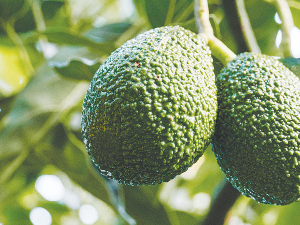NZ avocado growers report mixed season amid weather challenges
Avocado growers are reporting a successful season, but some are struggling to keep their operations afloat following years of bad weather.
 Newly announced World Avocado Congress 2023 keynote speaker Eric Imbert says the golden age is over for avocados.
Newly announced World Avocado Congress 2023 keynote speaker Eric Imbert says the golden age is over for avocados.
Attendees of the upcoming World Avocado Congress NZ 2023 can expect to be challenged by keynote speaker Eric Imbert.
Imbert, an international researcher and agri-economics and food technologies engineer, has been announced as the latest addition to the keynote speaker line-up.
The World Avocado Congress is taking place in Auckland from 2-5 April 2023 and will address the changing world of avocado production and consider how sustainable the global industry is across the environment, people and economics.
“The golden age is over and the world avocado market is changing fast,” says Imbert, the lead researcher for CIRAD, the French agricultural research centre working for the sustainable development of tropical and Mediterranean regions.
With over 20 years’ experience in fruit markets, across both commercial and research, Imbert is the publishing director of FRUITROP, CIRAD’s market news and research service specialised in the field of the international fruit trade.
He and his team closely follow the world avocado market and produce vital reporting data and market analysis, providing a transparent overview of the avocado industry in key exporting countries.
“We project world production based on data ‘from the grove’ and speaking with relevant growers in key exporting countries. We also forecast the evolution of demand in the most relevant world markets and subsequently cross those two trends.”
He says avocados are an incredible fruit and there is strong evidence of their health benefits.
“The growth potential of the market remains very strong, however, production is developing too quickly now.
“It’s essential we deliver this message to all stakeholders of the world avocado industry, who are often small or medium size growers.”
For the World Avocado Congress, Imbert will update his research to include more data and information on Australasia and provide a vision as to how the world avocado market can continue to evolve in the mid-long term.
As part of his first visit to New Zealand, Imbert will visit New Zealand’s primary avocado growing regions, taking in two of the eight field days offered at the congress. He also plans to meet with stakeholders right across the NZ value chain to hear their stories. Imbert will produce a report through his publication FRUITROP, on New Zealand’s avocado industry.
“A great part of the world production still comes from small to medium size growers, and the industry plays an enormous social and economic role,” he says. “It’s important to ‘protect the market’ working in two directions: reducing the plantation rhythm and also investing more in promotion to stimulate the great margin of growth that exists everywhere in the world.”
President of the World Avocado Congress committee Jen Scoular says Imbert’s topic aligns well with the Congress theme ‘Respectful’.
“The congress will challenge what we think we know,” Scoular says. “Our speakers will likely pose uncomfortable question and concepts. But, to ensure the sustainable growth of the global avocado industry, we must consider the phrase ‘growth occurs outside the comfort zone’ and all play our part in a vital conversation about the future of the avocado sector globally.”
“The global landscape has vastly changed since the last World Avocado Congress was held in Colombia in 2019. We continue to navigate the challenges of a post-pandemic world. While these challenges have forced some uncomfortable questions, they have simultaneously created and encouraged a future ripe with opportunities when it comes the changing world of avocado production.”
Legal controls on the movement of fruits and vegetables are now in place in Auckland’s Mt Roskill suburb, says Biosecurity New Zealand Commissioner North Mike Inglis.
Arable growers worried that some weeds in their crops may have developed herbicide resistance can now get the suspected plants tested for free.
Fruit growers and exporters are worried following the discovery of a male Queensland fruit fly in Auckland this week.
Dairy prices have jumped in the overnight Global Dairy Trade (GDT) auction, breaking a five-month negative streak.
Alliance Group chief executive Willie Wiese is leaving the company after three years in the role.
A booklet produced in 2025 by the Rotoiti 15 trust, Department of Conservation and Scion – now part of the Bioeconomy Science Institute – aims to help people identify insect pests and diseases.